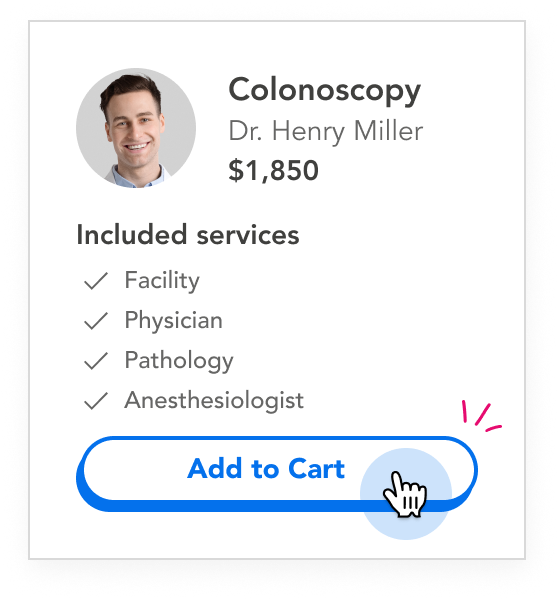Kidney Biopsy
Dallas Regional Medical Center Interventional Radiology
Financing Options
Promotional financing available when you pay with CareCredit. $200 minimum purchase. What is CareCredit?
MDsave and Your Insurance
Contact your insurance company directly to see if your purchase can count towards your deductible. Details
Procedure Details
Price Details
Your purchase includes the following services:
Facility fee
operating and recovery room services & supplies for outpatient stay (less than 24 hours) at Dallas Regional Medical Center
Physician fee
procedure fee for in hospital service.
Anesthesia fee
local anesthesia or moderate sedation services provided by your surgeon. If your situation requires an anesthesiologist be present to supervise the anesthesia or sedation services, you will receive a bill from the anesthesiologist.
Pathology fee
DOES NOT INCLUDE A PATHOLOGY FEE. The patient may receive a bill for this portion.
Tendo Marketplace fee
Covers the cost of contracting upfront rates with all involved medical providers, processing payment, and distributing funds, minimizing administrative overhead and allowing for a lower total price
Note
This bundled price includes the cost of your procedure and the fees listed above. These fees are for the services most frequently packaged together with this procedure. Any services that are not listed here will not be covered in your purchase.
Money Back Guarantee
We will refund your payment in full if you end up not needing your purchased procedure and do not receive care. Details
About Dallas Regional Medical Center Interventional Radiology
Dallas Regional Medical Center Interventional Radiology
Minimally invasive interventional radiology techniques are used to treat a wide variety of medical conditions. Radiologists use X-ray and other imaging technologies (MRI, CT, and ultrasound) to guide small wires or catheters (thin, flexible tube) with specialized instruments to treat affected areas of the body. These procedures only require a tiny incision where the catheter is inserted into an artery, so it results in less blood loss, less pain and a quicker recovery for patients.
Dallas Regional Medical Center offers a range of minimally invasive interventional radiology techniques to offer safe and effective options to treat a variety of conditions, including:
Angiography and angioplasty
A diagnostic angiogram is used to examine the inside of arteries and veins to detect blockages or narrowing of the vessels. In angioplasty, a catheter fitted with a balloon device is guided to the affected area to expand the walls and restore blood flow, or a laser can be used to break up the blockage. In some cases, a stent (mesh tube) is placed in the artery to hold it open. Angioplasty can be used to treat everything from heart disease and circulatory problems to ischemic stroke.
Embolization
Embolization is used to stop abnormal bleeding or to cut off blood supply to a particular area, such as a tumor. Catheters are used to deliver blood-clotting medication or to place particles or coils in the vessels to stop blood flow. Embolization can provide life-saving treatment for hemorrhagic stroke and trauma patients and can serve as an effective treatment for fibroids.
Radiofrequency ablation
Ablation is used to destroy abnormal cells with a catheter fitted with a tiny electrode. It can be used to treat everything from varicose veins and chronic pain to heart arrhythmias and cancer.
Vertebroplasty
Vertebroplasty is used to treat back pain and compression fractures of the spine. Doctors insert a needle into the affected vertebrae and inject bone cement to stabilize the vertebrae and prevent further damage.
Cardiac catheterization procedures
Interventional cardiologists use a variety of minimally invasive catheter-based techniques to treat heart disease, including angioplasty and stenting to unblock clogged arteries and veins, radiofrequency ablation to treat arrhythmias, and coronary atherectomy to remove hardened plaque from a blocked artery. Doctors use diagnostic exams such as nuclear medicine scans, angiograms, and echocardiograms, to examine the heart muscle, valves, veins and arteries for heart disease.
Additional Procedures Offered by Dallas Regional Medical Center Interventional Radiology
About Using MDsave
MDsave is a service for patients electing to pay cash for procedures. Procedure purchases must be made prior to receiving care. The provider will not file a claim for this service on your behalf. You can use HSA, FSA, or HRA funds to pay for your procedure. You may be able to apply payment to your deductible, however eligibility is determined by your insurance provider and depends on your plan. You can access your MDsave purchase history at any time to support your submission.
MDsave is pleased to accept CareCredit, a health, wellness and personal care credit card that provides promotional financing with flexible monthly payments.*
*Subject to credit approval. Minimum monthly payment required.
Get Care In Three Easy Steps
Compare Upfront Prices

Search by procedure and location to browse local providers and compare upfront pricing.
Buy Your Procedure

Pay for your procedure online or by calling (844) 256-7696. Or buy your procedure at the facility before your appointment is scheduled.
Receive Your Care

Follow the scheduling instructions given by your provider. Bring your voucher to your appointment.
Procedures
© Copyright 2025 MDsave Incorporated.
All Rights Reserved.

